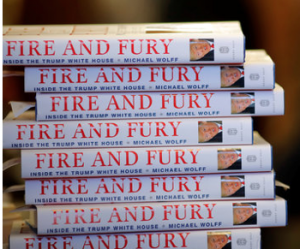Ok, Admit It! You Think You’re a Genius Too, But You Won’t Say So In Public.
Posted By Cliff Tuttle | January 6, 2018
No. 1,391
Donald Trump probably should have just ignored the publication of “Fire and Fury: Inside the Trump White House”, but that would have been out of character. This President strikes back when criticized and this occasion would be no exception.
Michael Wolff portrayed him as a low-intellect, television watching, undisciplined and incompetent man-child without the ability or inclination to engage in the work of the presidency. His response betrayed that he was deeply stung.
Who among us wouldn’t be? How would you like to be characterized as a big dummy? After all, he pointed out he had been a good student (went to Wharton) and became a billionaire and a TV star. And then he said the words that will be hung around his neck forever: “stable genius.”
Bad move. Dumb move, even.
But understandable. Don’t we all harbor some modicum of secret vanity in this realm? We think we’re smarter than most of the people around us, but we’re sure as heck not going to tell them. We’re not that stupid.
Smart or smarter is one thing. But what is genius?
If you look it up, Google will lead you to sites which will tell you that a measured IQ of 145 or higher classifies as genius. If you test that high, that score puts you in the top 1%. At that level, I have heard it said, you can learn anything you want.
But, as we all know, everybody isn’t equally capable in every discipline. Some few of us can fix anything mechanical. Some can learn foreign languages quickly and easily. Some can play musical instruments or paint portraits. Some can rapidly do complicated math problems without paper or pencil. Very few, even the most capable, can do it all.
And then, there is the mystery of creativity. We all remember a classmate in school who was a learning machine, capable of rote learning in prodigious quantities, but who rarely had a truly original thought.
I suggest that one aspect of genius (but not the only one) is the ability to solve difficult problems that have stumped others. We are not talking about mere riddles or brain-teasers here. The solutions frequently are original and creative. Yes, outside the box. These solutions can even be revolutionary. And why not? If the answer could be obtained by a lot of hard work or even long hours, somebody would have come up with it.
Genius is without precedent.
Napoleon was capable of making brilliant and unexpected moves on the battlefield in a glance. There was no science of military strategy then in existence that explained why he did what he did. He did it naturally, intuitively. And so with others: Leonardo, Newton, Einstein. They jumped effortlessly (or so we think) from one mountaintop to the next, without the need to follow the same path down and up the mountain that the rest of us must walk.
And so, does Trump qualify as a genius by this test? Maybe.
There is a certain resemblance to the Napoleonic style in Trump. He managed to figure out how to build Trump Tower in Manhattan with an array of powerful opposition fighting him on every side. If you read the Art of the Deal, you have to be impressed with his problem-solving ingenuity, paired with an unlimited supply of self-confidence and persistence. Yes, he made mistakes, big ones. Yes, he failed in many endeavors, lots of them. However, geniuses fail, too. In the end he seems to have figured out ways to survive and then to prosper.
This supreme egotist has publicly calls himself a genius. But that is only the latest in a series of audacious moves that he has dared to make. Meanwhile, the rest of us have played it safe. There’s a word for that: mediocre.
After all, genius is without precedent.
CLT




